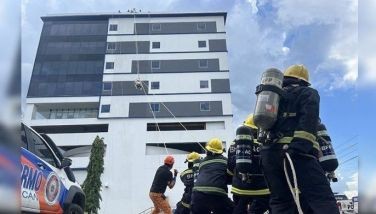Political franchise

(Part 2)
The House Committee on Suffrage and Electoral Reforms has approved the consolidated bill postponing the Barangay and Sanggunian Kabataan (Bgy/SK) elections to Dec. 4, 2023. This resolute committee action foreshadows the proposal’s equally smooth sail in plenary.
Congress sets the date of the Bgy/SK elections. In the Senate, existing postponement proposals also contain a clause regularizing the schedule of subsequent Bgy/SK elections at one year following every national and local election. Senate Minority Leader Koko Pimentel disabuses our minds, though, that postponement won’t be as automatic in the Senate.
We wrote last column of some arguments against postponing. Atty. Romy Macalintal is joined by other notable election law practitioners, including a certain Leila de Lima, who invoke constitutional and legal principles.
The stress is on the right of the people to select their leaders. Invariably, we read constitutional language on democracy (the very idea of elections) or republicanism (“sovereignty resides in the people and all government authority emanates from them”). The basic principle is always consent of the governed.
There is also the counterpart justification that voting includes the right to be voted for. The constitutional provision guaranteeing “equal opportunity for public service” animates arguments on this point.
The exercise of the right of suffrage is the most sacred of political rights in a republican democratic state. Behind every election law is the purpose, as explained by the Court, to assist voters in their participation in the affairs of government. Prevention of fraud is the corollary legislative aim. Purity of elections has been called one of the most fundamental requisites of popular government.
Random thoughts. The Constitution, the Omnibus Election Code and allied legislation embody the state policy to ensure, through the Commission on Elections, free, orderly, honest, peaceful and credible elections. In the academe and in practice, acronyms aid in memorizing: FC HOPE, FCHOP or CHOMP (M for meaningful in PPCRV literature). The Automated Election Law (AEL) adds a parameter: the word informed, to highlight the necessity for transparency.
The entire automation (formerly modernization) concept is a materialization of the informed and orderly framework. The AEL recognizes it simply: secrecy and sanctity of ballots; transparency and credibility of the process; fast and accurate results.
Automation applies to every stage of the election. Unbundle the process just like your electricity bill and you get registration, casting, counting, transmission, consolidating and canvass. One provider for all combined or break it down and consider contractors for each? Considerations of scale versus considerations of transparency.
Yes, economy and efficiency still rightly figure in the calculations. In other jurisdictions, you find more than one provider. This avoids monopoly and ensures that no one corporation has the power to control the elections.
Eating the pudding. A further nod to transparency is the institution of the Random Manual Audit (RMA). This feature of the law is a constant in arguments against manual or hybrid elections. Many are still Doubting Thomases. They prefer to see their votes: the ballots, the tally sheets on the desk or even the taras up on the board, in chalk or white board marker. In hybrid proposals, at least have the results at precinct level before they are transmitted through the ether. The RMA settles these doubts as the sampling should show whether the results are accurate. Better if the same is done also on election day and to use additional machines.
The voters’ list is another disputatious area. Purge the old, register the new. For decades, the lack of proper coordination with local civil registries (LCRs) left lists bloated and suspect, a boon for voters who could fly. With the advent of technology, NAMFREL articulates the common observation that the Philippine Statistics Authority and LCRs should be wired in with the Comelec through the necessary data sharing agreement.
Migrant workers, especially, need to be accurately surveyed if only to guarantee their enfranchisement. We have roughly 10 million of voting age but approximately 1.7 million only are actually registered.
The calvary of enfranchisement of the Filipino migrant worker is duplicated across territories. In whatever host country, registration is done at the consulate. If in the hinterlands, you’d have to drive or fly to the consulate in the city center. Blame the paucity of machines and requirement of biometrics. Unless security considerations are met or if technology devises a way to lower the cost of the machines or software, it will be a while before we can get to facile online registrations and biometrics.
This is one of the reasons why pilot mall-based voter registrations had limited success. A relief, of course, for prospective voters to undertake in air-conditioned malls. But how many additional registrants were added in the end when the machines used in the mall were pulled out from the local election offices?
Peaceful. The reduced incidence of violence is unmistakable. No more ballot box grabbing, burning or stuffing. The usual corrupt practices in the manual vote buying efforts which were contingent on proof of vote (easier with the handwritten ballots) are no longer viable. In the provinces, though, we still see practices like the quota system per barangay where you deliver what is required. Or else.
Bgy/SK elections, however, are not automated, given that the process is concluded at the precinct. It is the same old manual elections and these voting nightmares are still very much around.
In the exercise of the Commission’s quasi-legislative power, there are opportunities to strengthen the guarantee of fair and credible elections. Gray areas make for loopholes and loopholes are where election controversies germinate.
A common flare up during campaigns would be on the use of public/private spaces as poster areas. Last campaign, we endured the enforcement actions against supporters of certain candidates who insisted on putting up their propaganda as they saw fit. The general instructions should plug that.
- Latest
- Trending
























